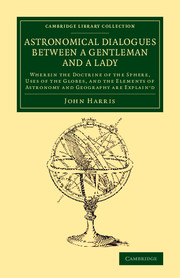
-
Select format
-
- Publisher:
- Cambridge University Press
- Publication date:
- June 2015
- November 2014
- ISBN:
- 9781316105955
- 9781108080194
- Dimensions:
- Weight & Pages:
- Dimensions:
- (216 x 140 mm)
- Weight & Pages:
- 0.27kg, 210 Pages
You may already have access via personal or institutional login
Book description
An Anglican clergyman and fellow of the Royal Society, John Harris (c.1666–1719) was an important promulgator of Newtonian science, through private teaching, public lectures and published writing. His Lexicon Technicum (1704) may be considered the first encyclopaedia in English. In the present work, published in 1719, Harris presents for his well-to-do readership a series of didactic conservations between a gentleman of science and an aristocratic lady. He aims to induce 'persons of birth and fortune' to dedicate some of their 'happy leisure … to the improvement of their minds', and uses quotes from poets such as Samuel Butler and John Dryden to help elucidate scientific concepts. In particular, Harris explains the use of contemporary scientific apparatus (and expensive status symbols) such as terrestrial and celestial globes. The book ends with a description of the ultimate contemporary symbol of scientific refinement: the orrery, a working model of the solar system.
Contents
Metrics
Full text views
Full text views help Loading metrics...
Loading metrics...
* Views captured on Cambridge Core between #date#. This data will be updated every 24 hours.
Usage data cannot currently be displayed.
Accessibility standard: Unknown
Why this information is here
This section outlines the accessibility features of this content - including support for screen readers, full keyboard navigation and high-contrast display options. This may not be relevant for you.
Accessibility Information
Accessibility compliance for the PDF of this book is currently unknown and may be updated in the future.

